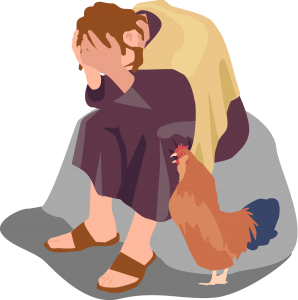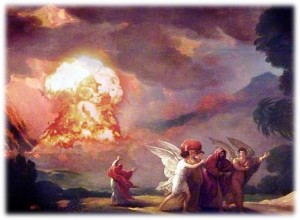EXODUS 10 – DECLARING BANKRUPTCY
Compared to my visits to the USA, where the rich/poor divide is easily seen in most cities, living in socialist Europe seems  easy for declaring bankruptcy. For those who have declared bankruptcy, they’re allowed credit once again in a few short years. Things are tight, but life can go on as before. It’s at this point, when the sun begins to shine again, the idea of putting their Maker at the center of the lives, is revealed. This is the pattern that we see even as far back as Ancient Egypt in today’s chapter, and human nature remains the same today…
easy for declaring bankruptcy. For those who have declared bankruptcy, they’re allowed credit once again in a few short years. Things are tight, but life can go on as before. It’s at this point, when the sun begins to shine again, the idea of putting their Maker at the center of the lives, is revealed. This is the pattern that we see even as far back as Ancient Egypt in today’s chapter, and human nature remains the same today…
Trouble/Storms hit >> In time, we’re brought to our knees >> When desperate for “divine intervention” we finally pray >> Relief comes as a direct result of our Maker’s compassion, to hear and answer our prayers >> Order is restored, the sun shines again over our lives >> We slide back into our “normal” ways without a need for God.
With the 8th and 9th plague in Ancient Egypt about to begin, today’s chapter shows how the Creator God began to prepare His people for their new future. The starting blocks are:
-
 their firm knowledge, without doubt i.e. knowledge that they would tell their children and grandchildren: the Maker of Heaven and Earth is Lord. [v2]
their firm knowledge, without doubt i.e. knowledge that they would tell their children and grandchildren: the Maker of Heaven and Earth is Lord. [v2] -
that we are to humble ourselves before Him [v3]
But before the journey begins, it’s important to note that there’s a difference between humbling and humiliating. Like any good parent, our Heavenly Father requires the appropriate level of humility from His children. Healthy humility puts His Lordship ahead of our human nature or earthly desire for power and control – just as a child would normally respect their father, with final authority in his hands, as head of the home.
 With that said, our Maker isn’t into humiliation. Each time He brought in a storm or pestilence, He told Pharaoh what was coming, when it was coming, why it was happening, and how devastating it would be. [v4-6] All what Pharaoh’s Maker wanted from him was to heed the warnings, think reasonably and logically, then choose appropriate surrender instead of ultimate bankruptcy. While his advisers blamed Moses for their trouble, I notice for the first time that they called the Creator God by His formal name: LORD. [v7]
With that said, our Maker isn’t into humiliation. Each time He brought in a storm or pestilence, He told Pharaoh what was coming, when it was coming, why it was happening, and how devastating it would be. [v4-6] All what Pharaoh’s Maker wanted from him was to heed the warnings, think reasonably and logically, then choose appropriate surrender instead of ultimate bankruptcy. While his advisers blamed Moses for their trouble, I notice for the first time that they called the Creator God by His formal name: LORD. [v7]
Out of utter desperation with virtually nowhere else to turn, and to save himself from further decline, Pharaoh compromised his true heart-position. Not really believing in God, he begins to cut a deal with his Maker, based on his own terms and conditions. [v7-10] This of course doesn’t work because the Creator God isn’t a puppet or servant to us. We can’t come to Him on our own terms, with our own ideas of what is acceptable and reasonable. If we want a relationship with our Maker, we need to remember that, from the very beginning of HIStory, He has never been a God of compromise. This isn’t because He’s neurotic or unfeeling. It’s because He is 100% perfect. From where He sits, He has a bird’s-eye view of the whole of human history. He knows what is coming around the corner; and, if He compromises in one area, there’ll be unforeseen repercussions up ahead.
And so the locusts came to devour Pharaoh’s life away until he was brought to his knees. At that point, he admitted that he had “sinned”. [v16] It’s important to note some things here.  For one thing, Pharaoh is the first person in the Bible to come outright and admit that he had sinned. This is a word that appears in the storyline and becomes the source of disagreement that has separated us from our Maker from the beginning. It’s therefore extremely important to know where the term came from, and its earliest uses, so that we can begin to understand what the term means for us today.
For one thing, Pharaoh is the first person in the Bible to come outright and admit that he had sinned. This is a word that appears in the storyline and becomes the source of disagreement that has separated us from our Maker from the beginning. It’s therefore extremely important to know where the term came from, and its earliest uses, so that we can begin to understand what the term means for us today.
The first person to ever use the word “sin” is the Creator God Himself. He told Cain, Adam’s son in the Book of Genesis that: “…sin is crouching at the door; and its desire is for you, but you must master it”.[a] So it’s outside us and has its own desires: like a roaring lion looking for someone to devour.[b] However, being designed in the image of the Creator God Himself, specifically as rulers[c], human beings have the capacity to control it (master it, keep it at bay).
The next reference to sin came at the destruction of the ancient cities of  Sodom and Gomorra where the men of Sodom were “exceedingly wicked and sinners against the Lord”.[d] So whatever they were up to, the “sin” must have been bad, because the concept is connected with another new term: “wicked”. History showed that death resulted from allowing sin to take over and not working to push back sin.
Sodom and Gomorra where the men of Sodom were “exceedingly wicked and sinners against the Lord”.[d] So whatever they were up to, the “sin” must have been bad, because the concept is connected with another new term: “wicked”. History showed that death resulted from allowing sin to take over and not working to push back sin.
After that, the Creator kept Abimelech (a Philistine ruler) from unwittingly sinning against Sarah, Abraham’s wife[e]; Jacob, Abraham’s grandson, asked his cousin what sin he was being accused of[f]; Joseph, Jacob’s son, refused to sin by sleeping with his master’s wife[g]; and Rueben, Jacob’s oldest son, told his brothers not to sin against Joseph by selling him into slavery.[h] But Pharaoh, in today’s chapter, is the first recorded person to admit to “sinning” against the Creator God, and openly admitted that God was right and he was wrong.[i] Pharaoh is then the first to connect sinning with forgiveness which, in turn, leads to the removal of death. [v16-17]
This important piece of information, woven into the fabric of the storyline, is vital: there’s a solution for sin. We can ask for forgiveness so that death in all its forms (from gradual decay to complete bankruptcy and utter destruction), can be removed from us. In Pharaoh’s case, sin was the cause of a physical decline that took a nation into eventual destitution. For us today, and without forgiveness, sin leads to spiritual death – the destruction of our relationship with our Maker, who is the Lord of LIFE. Any permanent separation from Him, as our source of eternal LIFE, can only ever mean “death”.[j]
 Years before anything was formalized by the Creator God (in terms of a rule book on how to keep sin at bay, thus remaining in a good relationship with our source of LIFE – just as he wanted for Cain at the beginning of HIStory), Pharaoh had the formula right. When we sin, then honestly regret our behavior (understanding clearly our predicament, including the consequences), we can freely ask our Maker for forgiveness. In response, our gracious Father God hears our prayer, and is more than ready to turn things swiftly around for us – in the same way that He showed mercy time and again to Pharaoh. [v18-19]
Years before anything was formalized by the Creator God (in terms of a rule book on how to keep sin at bay, thus remaining in a good relationship with our source of LIFE – just as he wanted for Cain at the beginning of HIStory), Pharaoh had the formula right. When we sin, then honestly regret our behavior (understanding clearly our predicament, including the consequences), we can freely ask our Maker for forgiveness. In response, our gracious Father God hears our prayer, and is more than ready to turn things swiftly around for us – in the same way that He showed mercy time and again to Pharaoh. [v18-19]
With all that said, the Creator isn’t limited to removing physical destruction around us, just to make us happy – like spoilt children who treat their parents as slaves to provide for all their whims. It’s much more complex than the here and now. HIStory is a global story from the beginning of time to eternity’s end, and it’s all about removing spiritual bankruptcy and ultimate death from us.[k]
In the meantime, and until He brings us home to His Kingdom, He’ll make a distinction by giving His people light. [v23] But the journey into His Kingdom can only be successfully traversed, if we fully understand that the One we are following is first and foremost God Almighty, before He fathered humanity and became our Father God. So, from this point on in this Adventure of Faith, two things are sure from today’s chapter: while our 100% righteous Maker won’t compromise for us in His solution for our present state [v24-29], if we happen to find ourselves on a life-path that’s leading to physical and spiritual bankruptcy, we are only one step away from His GRACE…
CLICK to return to today’s “Daily Breadcrumbs”
[a] Genesis 4:7
[b] 1 Peter 5:8
[c] Genesis 1:26-27
[d] Genesis 13:13 and 18:20
[e] Genesis 20:6-9
[f] Genesis 31:36
[g] Genesis 39:9
[h] Genesis 42:22
[i] Exodus 9:27
[j] Romans 6:23
[k] Revelation 21:3-4